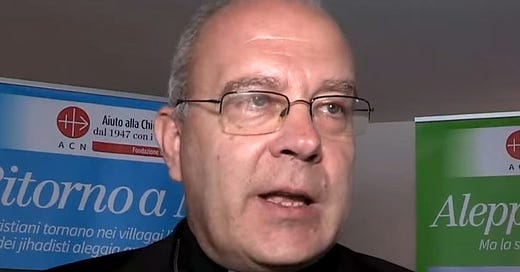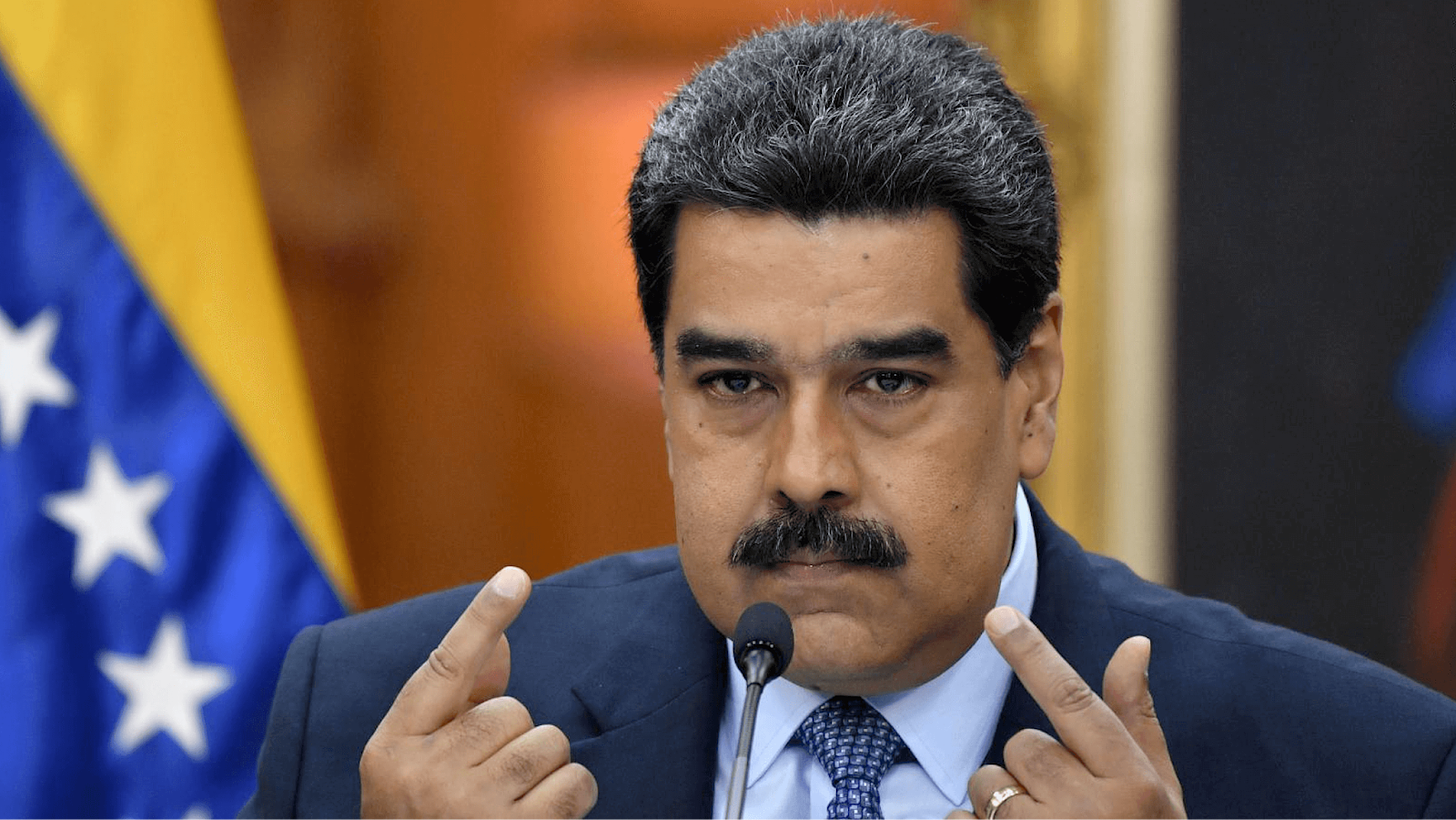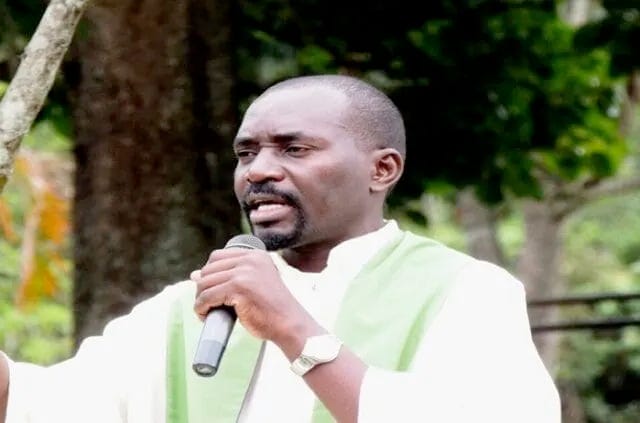
The challenge facing Venezuela’s new nuncio
Why Archbishop Alberto Ortega Martín is walking into a minefield
The Vatican announced May 14 the appointment of Archbishop Alberto Ortega Martín as the new apostolic nuncio to Venezuela.
Archbishop Ortega Martín has been a serving papal ambassador for a decade, seeing service first in Iraq and Jordan, then in Chile, before his new appointment this month.
But despite already serving in war zones and countries in the midst of protracted abuse scandals, Ortega Martín may now face perhaps the hardest challenge of his Vatican diplomatic career.
So who is he — and what is he up against?
Who is the new nuncio in Venezuela?
Alberto Ortega Martín was born in Madrid in 1962, and ordained a priest of the Madrid archdiocese in 1990. Long associated with the Communion and Liberation movement, he entered the Pontifical Ecclesiastical Academy — the training school for the Vatican’s diplomatic corps — in 1993 to begin his diplomatic career.
In 1997, the priest received his first foreign assignment, as advisor to the nunciature in Nicaragua, before going on to serve as secretary in the nunciatures of South Africa and Lebanon.
In 2004 he returned to the Secretariat of State’s diplomatic offices in Rome, and since 2007 he has headed the Vatican’s North Africa and the Arabian Peninsula desks within the Section for Relations with States, including working on negotiations to resolve the Israeli-Palestinian conflict.
Ortega succeeds Aldo Giordano, nuncio in Venezuela from 2013 to 2021, who died of Covid-19 a few months after starting to work as nuncio to the European Union.
Before Giordano, the apostolic nuncio to Venezuela was now-Cardinal Pietro Parolin, currently the Vatican Secretary of State.
The Vatican and Venezuela
In some ways, the Vatican has never had more Venezuelan expertise at its disposal than it does today.
Secretary of State Pietro Parolin served as nuncio to Venezuela between 2009 and 2013, just before his appointment to Rome. His sostituto, Archbishop Edgar Peña Parra, is also Venezuelan, and the superior of the ever-influential Society of Jesus, Arturo Sosa, is also Venezuelan. So Pope Francis probably has better access to information on the situation in the country than any of his recent predecessors.
And the situation in Venezuela has been crossing Francis’ desk since the beginning of his pontificate, which began just one week after the death of Hugo Chávez, then-president of Venezuela, in 2013.
Although the economic and political situation in the country had already deteriorated, for many, Chávez's death marked a before and after point, and in 2013 an unprecedented humanitarian crisis began in the country, with inflation exceeding 1 million percent for several years.
Public services collapsed: many cities went without running water for weeks and power outages of up to 12 hours were common.
Today, the situation has improved only slightly: in some regions, power outages last four hours, instead of 12.
Extreme poverty has exceeded 50% and a large percentage of the population can not afford food on a daily basis. Thousands of people have died from hunger or related diseases.
Since Nicolás Maduro came to power as president in 2013, he has severely curtailed already limited political opposition and further reduced civil liberties.
Hundreds of Venezuelans died protesting against the regime in 2014, 2017 and 2019 and several thousand have been imprisoned for the same reason.
The result has been the largest humanitarian crisis in the Western Hemisphere, with more than 8 million refugees fleeing the country.
Pope Francis has made several attempts for the Church to serve as a mediator between the regime and the opposition at various times. But all attempts at negotiation thus far have failed.
After the first major series of protests against the Maduro regime in 2014, there was dialogue between the opposition and the government. But while Pope Francis sent a letter to the participants to open the talks, and the apostolic nuncio was one of the mediators, it all came to nothing.
After a televised meeting and a few more sessions behind closed doors, the protests began to lose intensity and the government made no concessions.
Then, between 2016 and 2017, there was a new standoff between the dictatorship and the political opposition.
Maduro blocked – illegally, according to Venezuelan constitutionalists – a recall referendum against him at the end of 2016, which led to a new round of negotiations in the face of a crisis in the country.
The Vatican requested that the referendum be allowed to go ahead, bringing an end to the dialogue.
The 2018 presidential elections were another crisis point, and they were condemned by the international community – and by the Venezuelan bishops’ conference – for their lack of transparency and electoral guarantees.
As 2019 began, the National Assembly – which was controlled by the opposition – declared the presidency vacant and appointed the assembly’s own president, Juan Guaidó, as President of the Republic, following the provisions of the Venezuelan constitution.
But while many countries officially recognized Guaidó as the legitimate president, Cardinal Parolin said the Vatican was taking a position of “positive neutrality,” a stance which was widely criticized in and out of the country at the time.
Official neutrality notwithstanding, though, the Vatican soon began to show that it doubted the good faith of the Maduro regime.
Maduro wrote a letter to Pope Francis asking for another round of mediation by the Vatican to provide a way out of the political crisis in the country.
A letter of response signed by Pope Francis was leaked in which he addressed Maduro as “Sir,” not “President,” and said that government undertakings from the previous negotiations — such as the opening of a humanitarian channel and the calling of free elections — had not been fulfilled.
Furthermore, the pope added, “everything stopped because what was agreed in the meetings was not followed by concrete gestures to implement the agreements," closing the door to Vatican mediation if there were no concrete gestures from Maduro towards the democratization of the country.
As early as 2014, many warned the Vatican and the local bishops that these attempts at negotiation were going to fail — that Maduro was using them to buy time for himself in the face of protests.
And the failure of several rounds of Church-brokered negotiations have shaded public perception of Pope Francis and the Vatican in the country.
The Church is widely regarded as one of the most, if not the most trusted and popular institutions in the country and local bishops have considerable public credibility for having publicly and consistently speaking out against the abuses of the Maduro regime.
However, the relative silence and neutrality of Pope Francis and the Vatican in the face of large scale human rights abuses, and a clear desire not to back openly or formally either political side has attracted criticism.
This position has also seemed to clash with that of many Venezuelan bishops, who have been much more forthright in denouncing the Venezuelan regime.
The Venezuelan bishops, of course, have never criticized the Pope or the Vatican directly. And both sides have been careful to publicly show that there are different perspectives on how to deal with the conflict.
Francis has also offset his caution in not criticizing the regime openly by previously saying that “the voice of the Venezuelan bishops is [his],” but this nuance has not been widely appreciated in Venezuela.
Why Ortega Martín?
In his long diplomatic career, Archbishop Ortega Martín has a history of being posted into crisis situations.
After sensitive positions in Nicaragua, Lebanon and as part of the Vatican delegation in the Palestinian-Israeli conflict, Martín had his first appointment as nuncio in Iraq and Jordan in 2014, the same year in which Daesh proclaimed its caliphate from the city of Mosul and martyred thousands of Christians in Iraq and Syria.
In 2019, he arrived in Chile at the height of the clerical abuse crisis in that country which triggered the mass resignation of the entire local episcopate.
The previous year, Pope Francis endured a fractious visit to the country, enduring particular criticism for his defense of Bishop Juan Barros, despite allegations the bishop had covered up the abuse of one of the country’s most notorious predators, the priest Fernando Karadima.
Francis called the accusations against Barros slander during his trip, then claimed to have been unaware of some of the survivors’ accounts — despite Cardinal Sean O’Malley later confirming he’d ensured one such message was delivered to the pope.
Shortly after his visit to Chile, Francis apologized for having “made serious errors in the evaluation and in my perception of the situation, especially due to lack of truthful and balanced information.”
Also swept up in the scandal which engulfed the country’s entire hierarchy was the then nuncio Archbishop Ivo Scapolo.
Scapolo was reassigned to Portugal in 2019 amid accusations he’d ignored or failed to act on complaints against Karadima by other priests and victims since 2010.
Into this situation stepped Ortega, who generally kept a low profile, trying to restore the Church’s public credibility and working through a slate of episcopal appointments to replace bishops accused of covering up abuses.
Now, with his appointment in Venezuela, it seems clear that Ortega Martín is again being deployed as a kind of diplomatic crisis manager by the Vatican. And in his new role he’ll need both his ecclesiastical and political experience.
The challenges facing Ortega Martín
Venezuela is in an election year — and it is already highly controversial.
Presidential polls will be held on July 28, 2024. The main candidates are the quasi-incumbent Nicolás Maduro and the former diplomat Edmundo González Urrutia.
González Urrutia was registered as the principal opposition candidate after the candidate who won the opposition primary votes, former National Assembly deputy María Corina Machado, was controversially disqualified as a candidate over her previous support for international sanctions against Venezuela to put pressure on the Maduro regime.
Machado nominated Corina Yoris, one of the most recognized philosophers in the country, as her replacement, but the National Electoral Council did not accept her candidacy.
Eventually, González was registered as the opposition candidate.
In addition to issues fielding a candidate, the opposition campaign has been subjected to other forms of harassment and intimidation — hotels where Machado and González have stayed during the presidential campaign have come under government sanction or been closed, and several members of Machado's campaign team have been imprisoned or have taken refuge in foreign embassies.
The chances of a disputed or fraudulent result, followed by massive protests and government crackdowns are high.
If this is the minefield that Ortega Martín walks into as nuncio, the ecclesiastical landscape is hardly better.
The concordat that regulates relations between the Holy See and the Venezuelan State requires that the Venezuelan government approve episcopal appointments.
Maduro has sought to use this to his advantage. For example, Cardinal Baltazar Porras ended up serving as apostolic administrator of the Archdiocese of Caracas for four years after Maduro blocked his appointment as archbishop until 2023.
A similar case was that of Archbishop Victor Hugo Basabe, who was apostolic administrator of the Archdiocese of Barquisimeto for two years, until Pope Francis decided to appoint him as Archbishop of Coro, a much smaller and less influential archdiocese to which the government did not object.
The Archdiocese of Caracas could need another new archbishop soon, since Cardinal Porras is already 79 years old, and the Archdiocese of Valencia (the third largest in the country) is under the care of the bishop emeritus of the Diocese of Puerto Cabello as apostolic administrator.
These episcopal appointments could take a long time, and may well result in not-so-temporary temporary appointments as apostolic administrators, as was the case with Porras.
Perhaps even more alarming, another unusual form of persecution against the Church could begin to spread throughout the country.
On January 2, Fr. Josiah K'Okal was found dead in a forested area of the Delta Amacuro state. Born in Kenya, K’Okal had lived in the area as a missionary to the Warao people for almost 20 years.
His death was ruled a suicide, but people close to the case point to evidence it was more likely to have been a homicide.
Many believe that K'Okal was murdered by local irregular paramilitary groups for denouncing human trafficking in the region.
The Venezuelan state has ceded effective control of large regions of the country, mostly border and rural areas, to irregular and guerrilla groups that serve as de facto governing authorities in these areas.
In turn, poor neighborhoods in large cities are also controlled by criminal gangs who often have better weapons than the police or the national guard. In these areas, these gangs impose their own law.
In this complex context, local bishops and parish priests have emerged as informal authority figures who mediate between governments (local, regional and national) and such irregular groups.
At the same time, many of these groups think less strategically than the Venezuelan dictatorship and are often prone to violence.
While it is difficult to think that the dictatorship would go as far as to assassinate a priest or a bishop because of the diplomatic consequences, paramilitary and criminal groups, as the case of Father K'Okal showed, follow another logic.
The prospect that this could become a new front of persecution against the Church in Venezuela is high — and while it would not come directly from the national government, there would be no real prospect of government support or protection.
—
Archbishop Ortega Martín arrives with a long resumé as a skilled diplomat, one who enjoys the confidence of the Vatican and the Venezuelan bishops.
But navigating his new role and protecting the Church’s interests in Venezuela may need a miracle worker.











Excellent reporting by fellow Venezuelan, Edgar Beltrán. I am so pleased The Pillar was able to hire him.
What a situation that has gone on for years . All one can do here in the US is spread the word, write your congressman and pray. Mainly pray .
Venezuela , Nicaragua , Nigeria, the whole Middle East, Russia/Ukraine, China…